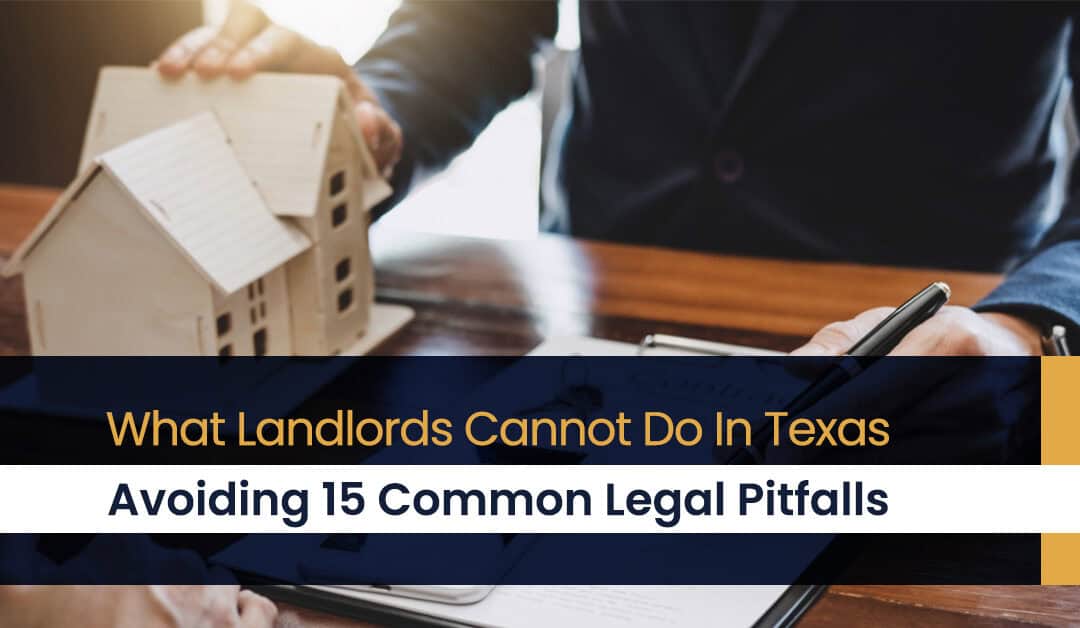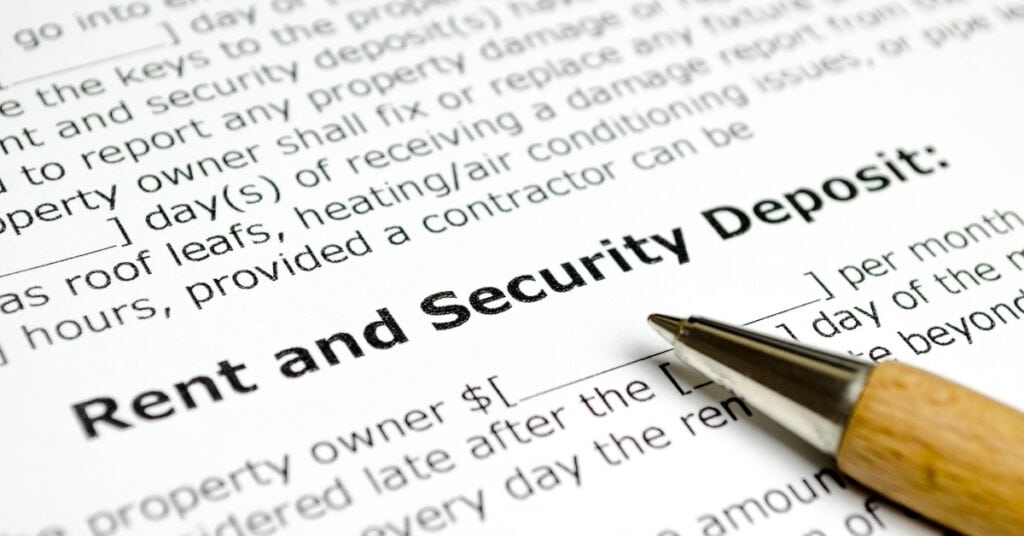Being a landlord in Texas comes with its challenges, and the law doesn’t always make things simple. When you’re managing rental properties, it’s easy to get frustrated when tenants violate agreements or cause problems. However, taking the wrong approach to resolve issues can lead to significant legal trouble for you. Texas law sets clear limits on what a landlord cannot do, and crossing those lines can escalate conflicts.
Let’s take a closer look at the legal mistakes landlords often make and how to avoid turning tenant disputes into lawsuits. Understanding your rights—and theirs—keeps your property and reputation protected.
15 Common Legal Pitfalls: What a Landlord Cannot Do
Managing rental properties in Texas can feel overwhelming when you’re navigating landlord-tenant laws.
Whether you’re a seasoned property owner or new to renting apartments, knowing what a landlord cannot do under Texas law is key to avoiding legal trouble.
Let’s break it down so you can handle your landlord-tenant relationship the right way.
1- Failing to Provide Proper Notice
When you need to take action, like ending a lease agreement or raising rent, you must follow proper notice requirements.
Texas law specifies timelines for giving proper notice, and ignoring them could lead to court proceedings or wrongful eviction claims.
- For month-to-month rental agreements, provide at least 30 days’ written notice before the lease term ends.
- For lease termination due to unpaid rent, follow the eviction process by giving tenants a 3-day notice to vacate before filing legal action.
2- Entering the Rental Unit Without Reasonable Notice
You cannot enter an occupied property without following the rules, even though you own the rental unit. Tenants have the right to quiet enjoyment of their home, and unannounced entries can lead to legal recourse.
- Texas law doesn’t specify a timeframe, but providing reasonable notice—typically 24 hours—is standard practice.
- Exceptions include emergencies like faulty electrical wiring or water damage that requires immediate attention.
3- Withholding a Tenant’s Security Deposit Unlawfully
When a lease expires or a tenant moves out, returning the security deposit is a crucial step. Both the landlord and tenant must understand the rules here.
- Landlords must return the deposit within 30 days unless deductions for damages beyond normal wear and tear are necessary.
- Failing to provide an itemized list of deductions could result in penalties, including losing the right to retain the deposit.
4- Unlawfully Evicting Tenants
The eviction process in Texas must be handled through proper legal channels. If you unlawfully evict tenants, you risk legal action that could cost you more than the unpaid rent.
- You cannot force tenants to leave by shutting off utilities or changing locks.
- Always obtain a court order before taking any steps to evict tenants who refuse to move.
5- Violating Fair Housing Laws
Fair housing laws prohibit discrimination against protected classes such as race, religion, disability, or family status. As a landlord or housing provider, you must treat all prospective tenants fairly.
- Denying housing to someone with a service animal or refusing reasonable accommodations for disabilities violates federal and state housing authority guidelines.
- Advertising rental apartments in a way that excludes specific groups can also lead to legal problems.
Don’t let tenant issues disrupt your peace of mind or jeopardize your property. At Jarrett Law, we’re committed to helping you resolve conflicts effectively and legally.
Contact us today at (832) 831-0833 to discuss your situation and find a solution that works for you.
6- Raising Rent Without Proper Notice
If you decide to increase rent on a rented property, you must follow the rules laid out in the lease agreement. Otherwise, you risk disputes with tenants and potential court proceedings.
- For fixed-term leases, rent increases are prohibited until the lease term ends unless the lease specifically allows them.
- In month-to-month agreements, landlords must provide a 30-day notice before increasing the monthly rent.
7- Ignoring Required Repairs
Landlords are responsible for making reasonable repairs to ensure the rental unit is safe and livable. If you neglect this duty, tenants may withhold rent or pursue legal action.
- Address issues like lead-based paint hazards, faulty electrical wiring, and plumbing problems promptly.
- Document repair requests and resolutions to avoid disputes.
8- Taking Tenant’s Property Without Legal Grounds
Even if tenants fail to pay rent, you cannot seize their belongings without following legal procedures. Taking a tenant’s property improperly could lead to claims of theft or wrongful eviction.
- If a tenant abandons the rental property, follow Texas guidelines for handling abandoned property.
- Always obtain a court order before removing any of a tenant’s possessions.
9- Prohibiting Service Animals
Fair housing rules require landlords to allow service animals, even if your rental agreement prohibits pets. Denying this accommodation can result in fines and lawsuits.
- You cannot charge additional fees for service animals, even if they cause wear and tear.
- Require documentation only for emotional support animals, and be sure it aligns with housing laws.
10- Failing to Address Complaints About Unsafe Conditions
Landlords must address safety concerns promptly. Tenants can take legal recourse if you fail to resolve hazardous issues in the rental property.
- Problems like broken locks, faulty wiring, or pest infestations require immediate attention.
- Ignoring complaints could allow tenants to break the lease early without penalty.
11- Discriminating Based on Family Status
Under fair housing laws, landlords cannot deny housing to tenants with children or impose restrictions that unfairly target families.
- Rules like “no children allowed” or refusing to rent apartments with multiple bedrooms to families could lead to penalties.
- Ensure all lease terms are fair and applicable to all renters.
12- Charging for Normal Wear and Tear
Landlords cannot deduct from the tenant’s security deposit for damages classified as normal wear and tear. Misusing deposits in this way often leads to disputes.
- Examples of normal wear and tear include faded paint or minor carpet wear from regular use.
- Keep detailed records of property conditions to clarify what damages are beyond acceptable limits.
13- Rushing Through the Lease Agreement
Every rental agreement is a legally binding contract. Skipping over details or including illegal provisions can backfire if tenants dispute them.
- Always ensure the lease complies with landlord-tenant laws and covers key terms like security deposits and lease termination.
- Review the document carefully with tenants to avoid misunderstandings.
14- Evicting Tenants for Withholding Rent Without Investigating
Sometimes tenants withhold rent due to unresolved repair issues. Instead of rushing to evict, resolve the problem to maintain the landlord-tenant relationship.
- Investigate whether the withheld rent is related to reasonable repairs you’ve neglected.
- Consider negotiating a payment plan instead of escalating the situation to small claims court.
15- Refusing Reasonable Accommodations for Disabled Tenants
Under fair housing laws, you cannot refuse reasonable accommodations for tenants with disabilities. Ignoring these requests could lead to serious legal consequences and fines.
- Examples of reasonable accommodations include installing grab bars in bathrooms or allowing a service animal in a no-pet rental unit.
- If a tenant submits a valid request, address it promptly to comply with both state and federal fair housing requirements.
By following landlord-tenant laws and treating your tenants fairly, you can avoid costly legal mistakes and maintain positive relationships with renters.
Facing Issues With Your Tenants in Texas? We Can Help
At Jarrett Law, we understand the challenges landlords face when managing rental properties. Tenant disputes can feel overwhelming, especially when eviction procedures or lease violations come into play.
That’s where we step in to guide you through every step of the process, ensuring you stay compliant with Texas law while protecting your investment.

Resolving Tenant Disputes the Right Way
Handling disputes doesn’t have to escalate into lengthy court battles. We focus on providing practical, cost-effective solutions tailored to your unique situation.
- Our team assists with drafting and delivering legally compliant “Notices to Quit” under Texas Property Code Section 24.005.
- We aim to resolve conflicts through mediation whenever possible, saving you time and legal expenses.
Navigating Evictions With Confidence
When eviction becomes necessary, the process can seem complex, but we simplify it for you.
Filing a Forcible Entry and Detainer suit under Texas law requires precision, and we handle every detail.
- We prepare all necessary paperwork and represent you in court to ensure compliance with eviction laws.
- By following proper legal channels, we help you avoid common pitfalls that could delay or derail the eviction process.
Protecting Your Property and Rights
Your rental property is an investment, and safeguarding it is our priority. Whether dealing with unpaid rent or lease agreement violations, we advocate for your interests while maintaining professionalism.
- We offer strategies to protect you from wrongful eviction claims or legal action by tenants.
- Our guidance ensures you meet state housing requirements and avoid costly errors.
Let Us Help You Take Control
Don’t let tenant issues disrupt your peace of mind or jeopardize your property. At Jarrett Law, we’re committed to helping you resolve conflicts effectively and legally.
Contact us today at (832) 831-0833 to discuss your situation and find a solution that works for you.






